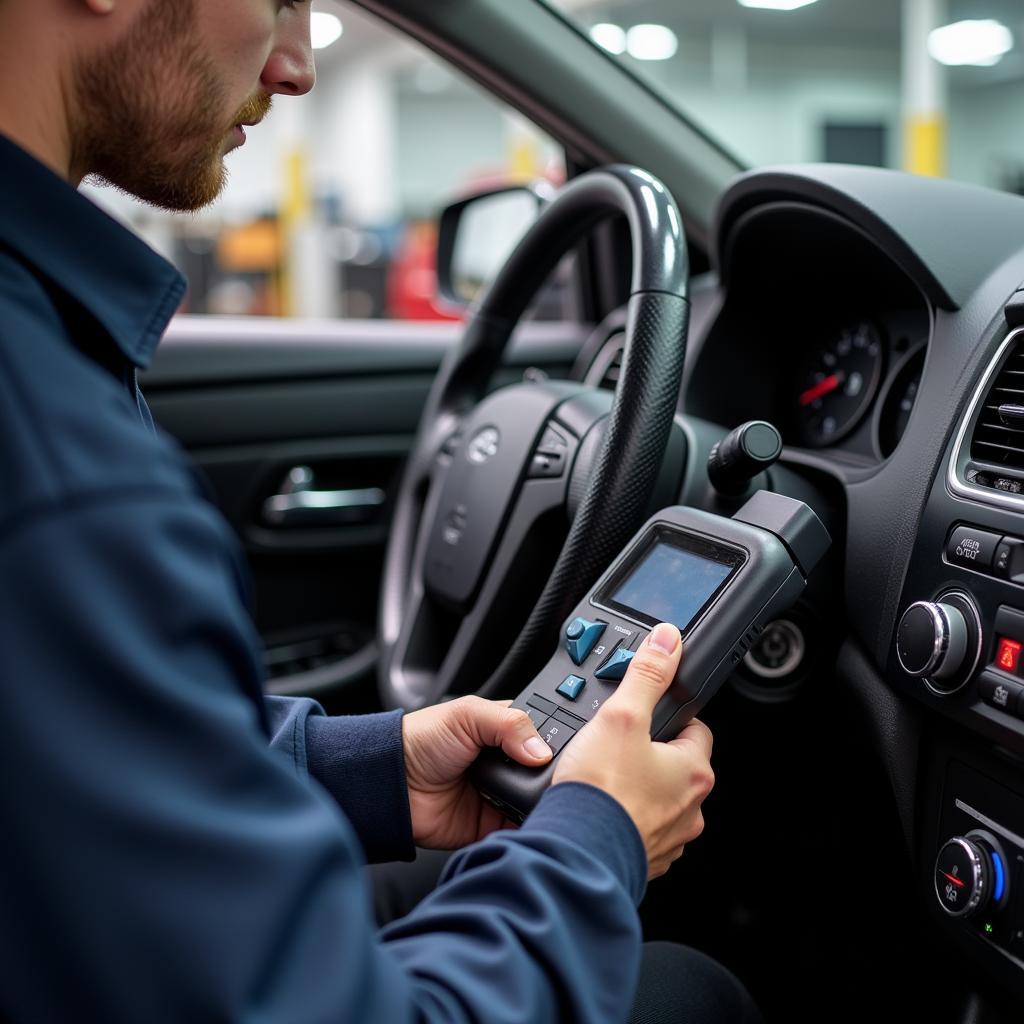Obd Car Diagnostic Professionals are increasingly in demand as vehicles become more technologically complex. These skilled technicians use their knowledge of On-Board Diagnostics (OBD) systems and specialized tools to diagnose and troubleshoot car problems effectively. Whether you’re a car enthusiast looking to understand your vehicle better or considering a career in automotive repair, this article provides valuable insights into the world of OBD car diagnostics.
Understanding the Role of an OBD Car Diagnostic Professional
An OBD car diagnostic professional is an expert in using computerized systems to identify issues within a vehicle. Gone are the days of relying solely on mechanical expertise; today’s automobiles are equipped with sophisticated computers that monitor various systems and store diagnostic trouble codes (DTCs).
 An OBD Car Diagnostic Professional at Work
An OBD Car Diagnostic Professional at Work
These professionals use a car diagnostic reader app or a dedicated OBD car diagnostic scanner to retrieve these codes, interpret their meaning, and determine the root cause of a problem. They possess a deep understanding of:
- OBD Systems: Different generations of OBD systems (OBD-I, OBD-II, etc.) and their functionalities.
- Diagnostic Trouble Codes: Interpreting DTCs, understanding their severity, and using them to guide the diagnostic process.
- Sensors and Components: Knowledge of various sensors (oxygen sensor, MAF sensor, etc.) and how they interact with the engine control unit (ECU).
- Troubleshooting Techniques: Using systematic approaches to isolate and identify the faulty component or system.
Essential Tools for the OBD Car Diagnostic Professional
The toolkit of an OBD car diagnostic professional has evolved significantly. While basic hand tools remain essential, specialized equipment plays a crucial role in modern diagnostics:
- OBD-II Scanners: These handheld devices connect to the vehicle’s OBD-II port and provide access to DTCs, live data streams, and other diagnostic information. Top 10 car diagnostic scanner lists provide valuable insights when choosing the right scanner.
- Diagnostic Software: Advanced software applications offer comprehensive functionality, including code definitions, wiring diagrams, component testing procedures, and access to technical service bulletins (TSBs).
- Multimeters: Used to measure voltage, resistance, and current, aiding in diagnosing electrical faults.
- Oscilloscopes: Provide a visual representation of electrical signals, crucial for analyzing sensor performance and identifying intermittent issues.
Benefits of Consulting an OBD Car Diagnostic Professional
While DIY car repair enthusiasts might be tempted to tackle issues themselves, consulting an OBD car diagnostic professional offers several advantages:
- Accurate Diagnosis: Their expertise ensures accurate identification of the problem, avoiding unnecessary guesswork and potential misdiagnoses.
- Time and Cost Savings: By pinpointing the root cause efficiently, they can save you time and money on unnecessary repairs.
- Access to Specialized Tools and Information: Professionals have access to advanced diagnostic equipment and resources not readily available to the average car owner.
- Preventative Maintenance: Regular diagnostics can help identify potential issues before they escalate into major problems, extending the life of your vehicle.
“Ignoring early warning signs from your car’s computer is like ignoring a fever,” cautions John Miller, a seasoned automotive engineer. “A professional diagnosis can catch minor issues before they become costly headaches.”
Finding a Qualified OBD Car Diagnostic Professional
When seeking professional help, it’s crucial to find a qualified and trustworthy technician. Here are some factors to consider:
- Certifications and Experience: Look for certifications like ASE (Automotive Service Excellence) and inquire about their experience with your vehicle make and model.
- Reputation and Reviews: Check online reviews and ask for recommendations from friends or family.
- Transparency and Communication: Choose a professional who clearly explains the diagnostic process, provides detailed reports, and communicates repair options effectively.
Finding the cheapest car diagnostic near me shouldn’t be your only criteria. Prioritize quality of service and expertise for long-term peace of mind.
The Future of OBD Car Diagnostics
The field of OBD car diagnostics is constantly evolving with advancements in technology.
 The Future of OBD Car Diagnostics
The Future of OBD Car Diagnostics
Some emerging trends include:
- Remote Diagnostics: Allowing professionals to access vehicle data and diagnose problems remotely.
- Predictive Diagnostics: Using data analysis to anticipate potential issues before they occur, enabling proactive maintenance.
- Artificial Intelligence (AI): AI-powered diagnostic tools are emerging, capable of analyzing vast amounts of data and providing even more accurate and efficient diagnoses.
Conclusion
OBD car diagnostic professionals play a critical role in keeping our vehicles running smoothly. Their expertise in utilizing advanced technology to diagnose and troubleshoot issues is invaluable in today’s automotive landscape. By understanding the importance of OBD car diagnostics and seeking qualified professionals, car owners can ensure accurate repairs, save time and money, and extend the life of their vehicles.
FAQs
What does OBD stand for?
OBD stands for On-Board Diagnostics.
How often should I get an OBD car diagnostic check?
It’s recommended to have your vehicle diagnosed annually or whenever you experience warning lights or unusual performance.
Can I do my own OBD car diagnostics?
While basic OBD-II scanners are available for consumer use, they might not provide comprehensive information, and misinterpretation can lead to improper repairs.
What is a DTC?
DTC stands for Diagnostic Trouble Code. It’s a code stored in the vehicle’s computer indicating a specific problem.
Why is the check engine light on?
The check engine light can be triggered by various issues, from minor sensor malfunctions to more serious engine problems. An OBD car diagnostic scan can pinpoint the exact cause.
Need help with your car’s diagnostics? Contact our team of experts via WhatsApp: +1(641)206-8880 or Email: [email protected]. We’re available 24/7 to assist you!

Leave a Reply